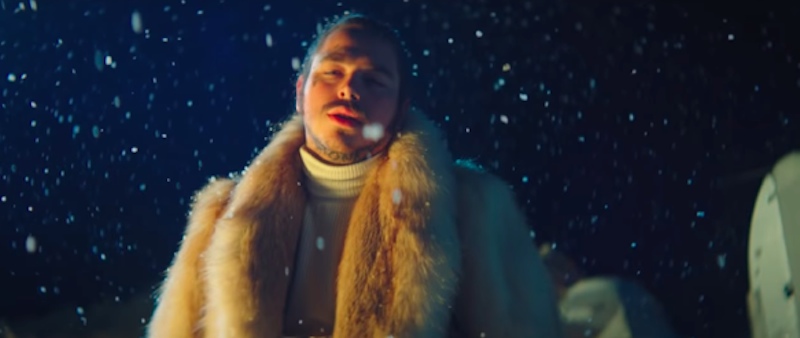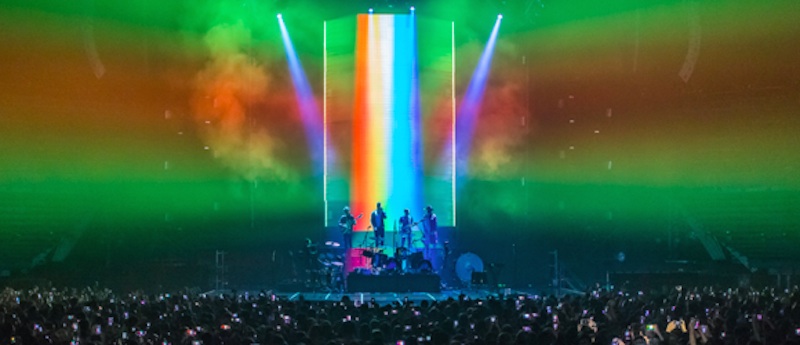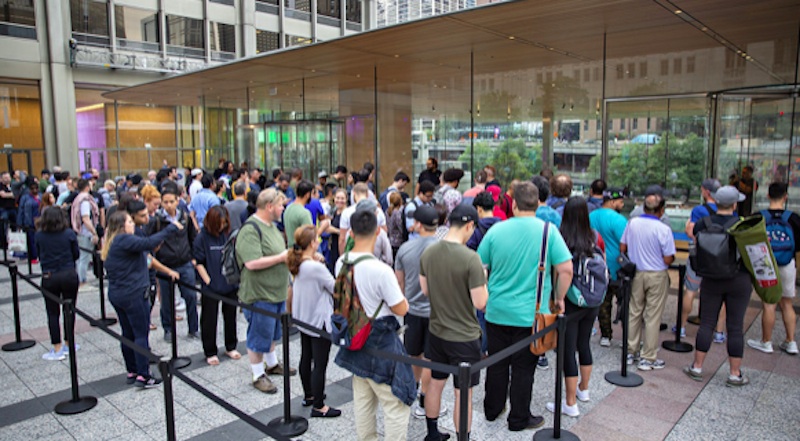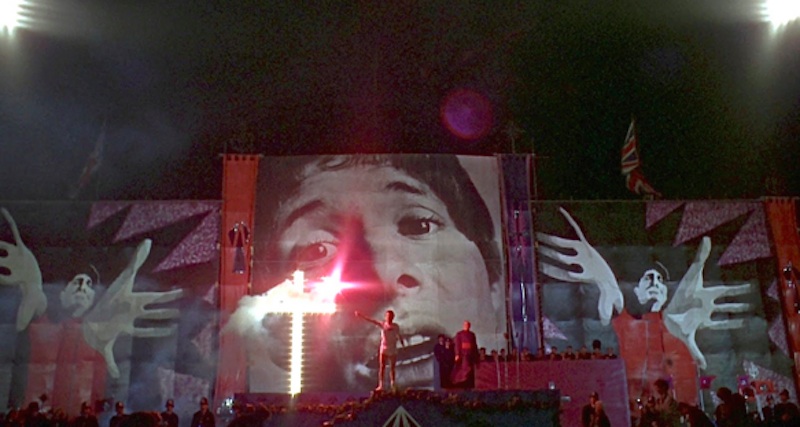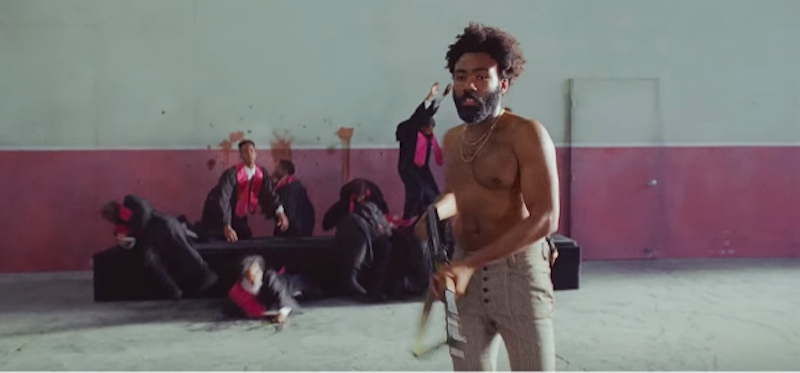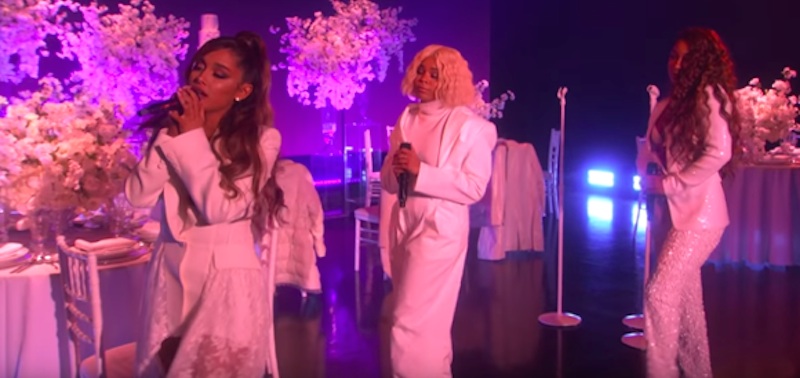In our society, it is generally understood that music is good, music culture is a positive, that fandom is a fun and worthwhile endeavor for a well-adjusted member of society. However, as our fantasies get darker and darker, adjusting to reality and its encroaching bleakness, music and recorded sound will inevitably shift from being a source of inspiration to one of ironic and depressing nihilism.
Take that song you loved from this year, whatever it is, that swooning ballad, that club banger, that anthemic fist-pumper: Peel it away from the personal drama of its creator, and run it at full blast over a slo-mo highlight reel of your worst nightmare: A school shooting; a dying polar bear walking on a disappearing glacier; an act of terrorism; migrant children in cages crying; a hurricane destroying a school; a room full of NRA executives lighting stogies contentedly. The particulars aren’t as important as the fact that these moving images represent the real present, and the music for the most part represents the wide disconnect between reality and fantasy. Music increasingly creates a world we would like to live in, without making that world anything more than an emotional aspiration.
Post Malone and the absurdity of the modern pop star: “Psycho” video, 2018
Prior generations that created this dream-sphere of music culture and emotional manipulation lacked a certain imagination when it came to sensing the form of the approaching dystopia: So fixated were our greatest post-war minds with a hypothetical state-run hellscape that they convinced future generations to run screaming in the opposite direction, leading us to the panopticon/feudalist moment that we all now find ourselves in the midst of. For each age there is the moment when, as hopes decline like Icarus and son with melted wings, the prophets of the generation cry out in disillusionment, “The dream is over!” For the children of 2018, however, any such declaration would surely be meant with cackling derision: Not only is the dream over, there never was a dream in the first place, and, by the way, can someone please make this nightmare stop?
Popular music in 2018, the sounds and songs that one hears incidentally, accidentally, unconsciously, unwittingly, only makes sense if you factor in the massive psychological depression of the populace.
It isn’t that the music is depressing per se; rather, with the dream long since over, we are left with market efficiency, infinitely scalable product in ever-tighter niche markets, with more and more of a sense that if we find music that is for us, it’s a secret for our ears rather than a unifying movement. Or maybe it’s worse: That even if we feel like we are part of something larger when we hear popular music, we have… ambivalent feelings about being a part of a mass culture, because everything is compromised and rotten, and this music isn’t ours anyway, really. Sometimes it feels, at best, like utterly empty uplift, an uplift that, come to think of it, we never consciously chose in the first place.
Imagine Dragons, creators of four of the top five Hot Rock Songs on Billboard’s year-end list
The fear used to be that the state would eventually control the artist, and use the artist’s gift, against his/her will, to reach the masses: Thus would hip culture aid and abet totalitarianism. Religion and government would infiltrate old timey entertainment institutions, creative geniuses would be forced to do the bidding of leaders bent on domination, and the result would be contrived and compromised art that stifled the creative voice and tamed the youngest and most socially engaged.
This once made sense; after all, the shift to a mass media in the early 20th century aided and abetted fascism globally on a scale never before seen. More importantly, those in the entertainment industry could see that the celebrity crazes brought about by mass communication, whether it was the film star, the pop star, or the rock star, spoke directly to people’s emotional, not rational, reactions to the respective cultural products. People didn’t become hysterical because of their relative proximity to a superstar: The mania was a response to new technological weapons that had specific emotional resonance.
Profit on a massive scale for music, whether it was printed sheet music booklets, vinyl records, or digital tuneage, has always depended on this resonance; in times of yore, this manifested itself in intense fandom, whereby the fan in question would need totemic proof of his/her/they sufficient dedication to the artist at the center of their emotional thrall. In the early days of rock and roll, the high voltage beams of television exposure, cultural controversy and radio and record store huckerism collided to form a supernova explosion, erupting into a cultural mania that led to rioting in the streets and screaming passed out fans at concerts and in-person media events.
2018: A different consumer mania perseveres
This riotous and seismic upheaval in the mass public’s relationship to recorded media was world-altering and utterly deranged: For several subsequent generations, it was assumed that every cohort in these modern and post-modern times would have their own senses-shattering upheaval tied to recorded sound. This assumed that it was the sound, or the songs, or the overall aesthetic of the artist, that was the source of the mania, and not the emotional derailment of the senses brought about by a postwar technological sophistication.
Rock and roll was posited as the ultimate rebellion; popular music aimed at the young was propositioned as the sound of liberation, freeing the young, emotionally if not literally, from the chains of their elders. This was music without rules, and the content mattered; lyrics mattered, arrangements and volume were important, everything within the performance and packaging was a signifier to a new generation of how the revolution would be executed.
The glopping sighing blurrrg encompassing everything one hears nowadays isn’t the result of any digital trickery or mastering compression algorithm: It is the sound of music when everyone involved knows, deep down, when they are being honest, that it doesn’t matter. The fear of prior generations was that The Man would step in and attempt to stifle the voice of their musical prophets; or worse, that a powerful state could work covertly to co-opt these prophetic voices. This dystopian vision saw a future where church, state and popular entertainment worked in tandem to fool the masses, to get the young and active to center their energy not on empowering their lives and that of their brethren, but to blindly worship a creation beholden to the state.
Pop music artist as captive/martyr to state power: Paul Jones as Steven Shorter in Peter Watkins’s 1967 dystopian classic Privilege
This pop messiah complex saw popular entertainment as a war of ideas, where the all-important message of a popular entertainer is crucial to society’s advancement. Popular music that combines sheer populist power with show biz chops is widely held to be the most successful; in times of rising autocracy, then, the theory holds that this power must always be in the proper hands, for a reckless abandonment of principles by rich and careless pop music stars could mean curtains for our democratic way of life. The message is key, once an artist attains power, according to think manner of thinking: artists who make it big and then performatively display transgressive acts of populist theater will be seen as being deserving of the wealth and fame they have attained.
With cameras rolling, Drake handing a stack of cash to a Miami family in the “God’s Plan” video, 2018
This is the thinking that allows the general populace to buy into an ecosystem where an ever-evolving music-technology landscape perfects the goal of music-as-commodity, all the while thinking that artists and songs and physical manifestations of recorded sound are valuable in market terms. The bogeyman, as it turned out, wasn’t state control, it was the unholy alliance of corporate monopolizing and high tech, which centralized the means of music production beyond the wildest dreams of a mid-century European dictator. A modern-day music listener is far more subject to the whims of a streaming service or an internet carrier than a pre-Internet music fan was to a radio conglomerate or record store chain.
A product that is scalable, profitable, consumed by a relatively undiscerning audience that never quite realizes the addictive nature of the arrangement they entered into rather casually: Recorded music clearly fits into a line of marketing innovations, from tobacco and nicotine to the internet and smartphones, whereby technological innovation combined with a ruthless will to hook an audience for a product that they cannot live without becomes an emotional center to people’s regular lives. The artists that people are inundated with nowadays, the veteran celebrities and flash in the pans alike, must make their name within this pipeline of product efficiency, finding a way to fit their own inclinations and idiosyncrasies in this maximally compressed panoply of sounds and voices.
Donald Glover a.k.a Childish Gambino, “This is America”, May 2018
Again: In the way that the pipeline has evolved, controversy is no longer something that label heads need to train artists to avoid, Pygmalion-style. Rather, artists that trade in pushing boundaries with their presentation serve to cater to a niche audience, one that looks to music culture to address their social anxiety. Anxiety is a powerful disruption in the æther, and in times of ever-expanding malaise, it is in the best interests of those that provide us with our musical entertainment to counter said anxiety, else the elephant in the room can go unnoticed and kill business for everyone.
Dystopia means perpetual unease; thus it is entirely likely that each year will forever bring us edgy confrontations with the messy and disquieting events ripped from the headlines. Is it a useful service to placate our felt fears with this counter-programming, like combining alkaline and acid — or is it merely the way that our current manner of society finds a way to fold the worst unthinkable events into the fabric of our days and months, smoothing them over into a serviceable equilibrium?
The answer to that particular question has to do, ultimately, with the perceived utility of shared experiences in a society that is not just fragmenting but in the process of becoming segmented into dueling realities in ways that are hardening into semi-permanence. The most successful artists then, successful in the sense of solidifying a lasting legacy outside of celebrity-qua-celebrity, find a way to merge the mundanities of their personal life, the glamour of their manufactured image, the attitude of their musical product, and make that final product transcend a typical human life cycle by fusing all of those elements with a powerful-if-ever-evolving political/socio/cultural statement of purpose. These artists may not always be on top at all times, but if they can stick to their guns long enough they can live to see themselves treated as gods in their own lifetime.
Bow down, bitches: Beychella 2018
That said, the extremely infrequent success story of an artist does nothing to change the fact that popular music is officially the soundtrack to, if not the apocalypse, at least our slick slide into deep, deep societal depression. 2018 wasn’t the sound of getting on up, getting involved, or getting into it: It was the audio companion of curling up in a fetal position with a pint of Ben & Jerry’s, at best. We as a society can’t figure out some of the more basic civic functions in order to get ourselves over the hump of the 21st century — but we have figured out how to frictionlessly pump sounds into people, and simultaneously allow every person an instant and direct pathway into the beating heart of a real live celebrity, for what it’s worth.
Ariana Grande, singing “thank u, next” on Ellen, November 2018
Which is, I suppose, the point of it all: To communicate a feeling that is hard to express from one person to another, in a one-to-many relationship. But the usefulness of this sort of interpersonal fussiness is becoming hard to get a read on as too many other important real world benchmarks and trusted guideposts are sliding off into oblivion, never to return. Perhaps this is just a baseless fear, perhaps we will slide back into some kind of normalcy and the decadent intimacy that popular recorded music transmits so pleasantly will slot in tighter with the general feel of this 21st century existence; but it seems far more likely that music will remain a high quality well-branded aural commodity that increasingly pairs well with a front row view to the atrocities of the near future.
Follow Daniel Brockman on Twitter @thebizhaslanded.

